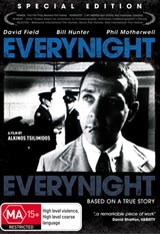
EVERYNIGHT, EVERYNIGHT
Australia, 1994, 85 minutes, Black and White.
David Field.
Directed by Alkinos Tsilimidos.
Everynight, Everynight is a small-budget, black and white, Australia drama co-written by Alkinos Tsilimidos, the director, with playwright Ray Mooney. It is a story about H Division, Pentridge, Melbourne. It shows behaviour of guards and prisoners before the Royal Commission into brutality and the ill-treatment of prisoners. H Division was closed, finally, in 1994.
There have been several films about prison in Australia, especially Stephen Wallace's Stir and Ghosts of the Civil Dead. This latter is reminiscent of Everynight, Everynight.
The film is hard to watch, inviting audiences to experience the sufferings and claustrophobia of the prisoners. David Field is very strong as the central prisoner (as he was in Ghosts of the Civil Dead). Bill Hunter leads the cast of guards (and he is reminiscent of his hospital guard in Esben Storm's 27A, 20 years earlier).
The film is fairly unrelenting and demands a great deal of concentration (and endurance). Tsilimidos was nominated for the AFI Awards of 1994 for best director.
The character of Dale is based on Christopher Dale Flannery, who became a prominent hit man and who disappeared. Thor Motherwell, who appears as the Barracuda, is an actor and playwright who spent some time in Pentridge himself.
1. A grim and relentless prison film? Based on a true story?
2. The black and white photograph, the interiors, claustrophobic? The musical score, the song? On the cross?
3. The title and its relentlessness, the audience invited to share this?
4. The prologue about the guards, the imitation of the bird, Bryant and his place in the prison?
5. The introduction to Dale, the background of his experience, age? Audience sympathies? His not having been tried? His cheeky attitude, rudeness to the governor, being sent to H Division? On the cross, the brutal bashing, the following of orders, calling officers "Sir", the humiliation of the stripping, of the strip-search, the continual humiliations? His relationship with the others in the division? In his cell, the pain of the bashings, his appendicitis? Saving the food before it was called back? The bashing of Stones in the yard? Having to give his name? The continual brutality? His photo of Lorraine? His wanting her to visit and the guards pretending she was there? The visit of the padre and his asking forgiveness, the memories of the boys' home and his being bashed? The tattoo of the cross on his back to remind the priest that he should be compassionate?
6. The portrait of the guards, Berryman and the others? Berryman as focus? Brutality, manner of speaking, exercise of power? Egging each other on? The nature of the sadism? Their reaction to the governor and giving a favourable impression of themselves?
7. The other prisoners, Bryant and his madness? The Barracuda and his violence, Dale seeing him as a spy, changing his attitude? The Barracuda and his mocking of the Salvation Army men and their giving food for the fires, and the sexual abuse of the boys? Tige and his depression? The other prisoners?
8. The governor and his Irish style, his whims and decisions, his concerns, wanting the prison to be run well, the reliance on Driscoll? His reaction to Dale?
9. Dale's decision to strip and opt out of life, untouched by the guards, shouting and urging the other prisoners to do the same? His frustrating the guards? His sense of inner freedom?
10. The visit of the padre, his asking forgiveness, making Dale the example with the beatings, his not wanting him to be an example for the other boys?
11. The verbal quality of the film, the rhetoric of abuse, the rhetoric of frustration, the interchanges between Berryman and Dale, the reactions of the Barracuda?
12. The build-up to the inquiry, the prisoners finally getting out, the prisoner hanging himself, Berryman and his replies to the commission, his lies? The aftermath and the exoneration of the guards?
13. Prison as an image of society, a gauge of the humanity of society and how it treats its prisoners? The experience as relentless?